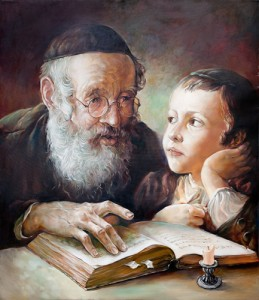 The Torah reading this week begins: “These are the generations of Yitzchak ben Avraham, Avraham fathered Yitzchak” [25:19]. It seems redundant to say that “Avraham fathered Yitzchak” — the Torah has, by this time, presented in great detail the circumstances of Yitzchak’s birth, his near sacrifice, and the process by which his wife was identified and brought from her home to marry him. Even in this verse, the Torah calls him “Yitzchak ben Avraham,” which of course means Avraham was his father! What’s the message?
The Torah reading this week begins: “These are the generations of Yitzchak ben Avraham, Avraham fathered Yitzchak” [25:19]. It seems redundant to say that “Avraham fathered Yitzchak” — the Torah has, by this time, presented in great detail the circumstances of Yitzchak’s birth, his near sacrifice, and the process by which his wife was identified and brought from her home to marry him. Even in this verse, the Torah calls him “Yitzchak ben Avraham,” which of course means Avraham was his father! What’s the message?
The Ramban [Nachmanides] points out that at the end of last week’s reading, the Torah describes “the generations of Yishmael ben Avraham” [25:12], so you might think the two are equal. “Therefore the Torah goes back and says Avraham gave birth to Yitzchok, to say that Yitzchak alone is his progeny.” Yitzchok was the fulfillment of Avraham’s potential, the creation of another patriarch of the Jewish nation. Yitzchok, not Yishmael “whom Hagar, the Egyptian maidservant of Sarah, birthed to Avraham” [the continuation of 25:12] nor any of the children of Keturah, was the one who carried Avraham’s mission forward.
From the beginning, the Torah talks about the importance of carrying the Jewish mission from one generation to the next. Today, of course, a person is a member of the Jewish people whether or not he or she is even aware of it, much less able to personally educate the next generation. But nonetheless, Judaism requires that we educate both ourselves and our children.
When Project Genesis started over twenty years ago, the first National Jewish Population Survey had recently shocked the Jewish establishment with an intermarriage rate of over 50% among young Jews, and a general decline in Jewish affiliation. In a state of near panic, complete with projections of only 10,000 Jews remaining in the New York area by the end of the 21st century, money was suddenly allocated for “Jewish continuity” programming. Most of that money, however, was (and is still) invested in social programming, music and dance — and as the recent Pew Report showed us, nothing has changed.
Nothing, that is, save the rapid growth of communities where Jewish day school is the norm, rather than the exception. The Orthodox community has defied the demographic trends identified by the NJPS, recognizing that there is a core mission to transmit Avraham’s message to the next generation. Helping every Jew to grasp hold of our heritage is not a way, but the way, to ensure that he or she is part of the Jewish future.




Today many of the Commandments and Holy laws are being either ignored, or even rewritten for todays growing liberal society, with many congregations and religious faiths adapting new modern definitions of the Holy Scriptures. Can you please explain what the Torah says about updating scriptures for liberal life styles, is it permitted or acceptable, is the Torah, or Commandments gray and white. I would really appreciate your views and opinions on this subject I try hard to respect and to honor the Holy Scriptures, they are not gray and white scriptures for me. Thank you so much, and Shalom…
Thank you for your question. While one is certainly encouraged to look for relevancy in the word of the Torah, they have to always be careful not to force their own definitions of relevancy into G-d’s eternal words. The Torah contains G-d’s infinite wisdom and it states several times that its words are eternal. A humble student of Torah will listen to what the words are telling him, rather than impose their own personal values – telling the Torah adapt to the times. We rely on the Oral Tradition that originated at Sinai itself, and the experts in that tradition throughout the ages, to learn what the Torah is telling us. That tradition is largely embodied in the Talmud, and the classic commentaries that followed.